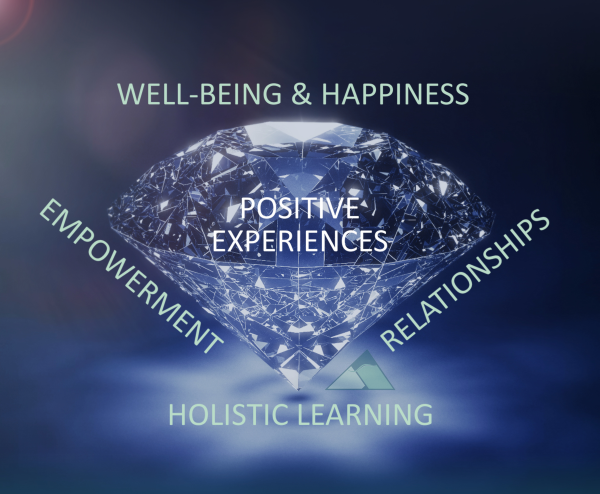Join our popular course to learn how meaningful relationships can transform practice
‘I’ve learned that people will forget what you said, people will forget what you did, but people will never forget how you made them feel.’ Maya Angelou
Discovering diamonds

The Diamond Model is one of the most powerful concepts in social pedagogy, a values-led approach to relationship-centred practice that aims to support people to flourish and feel socially included. The metaphor of the diamond visualises its central underpinning principle: As human beings, we are all precious and possess a wealth of skills, abilities, talents, knowledge and other resources that make us rich in very unique ways. There is a diamond within everyone of us. Not all diamonds are polished and sparkly, but all have the potential to be. Similarly, every person has the potential to shine – and relationship-centred is about how we can support people to uncover and recognise their potential, to draw out their inner richness. It’s about how we make them feel: treated with kindness and respect for who they are, connected with their inner resources, and empowered to create meaningful change in their lives.
Course Content

Session 1 – Introduction to the Diamond Model and Haltung: This session introduces you to the fundamental values of social pedagogy and how we express these in our interactions to build meaningful relationships
Session 2 – Authentic Relationships: This session explores how we can develop authentic relationships that support social inclusion and meaningful belonging
Session 3 – Well-being & Happiness: This session focuses on how we can holistically support people’s well-being and happiness through relationship-centred practice and the shift in mindset this requires.
Session 4 – Holistic Learning: This session explores how we can facilitate holistic learning opportunities through relationships supporting strength- based practice
Session 5 – Empowerment: This session explores how we can create conditions in which people feel a sense of recognition and empowerment
Session 6 – Creating Positive Experiences: This session examines how we can create positive experiences in the everyday, enabling individuals to form and enjoy both independence and inter-dependence in their own lives
We’ve designed this course together with Ali Gardner, co-author of Social Pedagogy and Social Work, to be particularly relevant to professionals working with children, families, vulnerable adults, disadvantaged communities and older persons.
Connecting learning with your practice
Over the course of six 3-hr sessions, we will build a peer learning community in which participants increasingly take on greater responsibility for supporting each other in the ongoing process of applying your learning to your respective role as practitioners in your specific practice context. Why is this a powerful way to achieve practice improvement? Because converting learning experiences into meaningful behaviour change relies on three factors:
- CAPABILITY: Acquiring new skills and insights into relationship-centred practice, connecting theory, values and practical methods
- MOTIVATION: Being eager and feeling confident to create positive practice change, connecting with your values and relational abilities
- OPPORTUNITY: Finding ways to apply learning in practice, creating the space for self-reflection within the peer learning community, and identifying further opportunities for developing relationship-centred practice
We expect participants to commit to taking action in between each session, so that you can practice developing more meaningful relationships both in your professional and personal life.
Learning aims
By connecting social pedagogical concepts and principles to your practice, you’ll be able to:
- Apply relational approaches to support strength-based practice.
- Understand the role of learning in facilitating well-being, resilience and empowerment.
- Develop relational leadership skills supporting professional practice in complex environments.
- Adopt a range of reflective tools to enhance relationship-centred practice.
- Look forward to future practice with a renewed focus on the values, key purpose and goals of your work.
Each 3-hr session is designed to connect capability, motivation and opportunity by giving you time to explore an area of your practice that you’re determined to change, plan a micro-intervention – a small thing you’ll do to develop your relationship-centred practice – and commit to your peers that you’ll come back the following session having tried this out.
Testimonials
In my role as a Principal Social Worker I hold social work values, skills and relationship-based practice as key to the respect and empowerment of the people we work alongside. We have been extremely fortunate to engage Gabriel and the team at ThemPra through our Teaching Partnership to deepen our skills and learning around relationship-based practice and social pedagogical approaches. The learning has been fun, powerful and purposeful – an investment that I believe will reap rewards in terms of improving outcomes and experience.
Becky Squires, Principal Social Worker, Cumbria County Council
Social Pedagogy has completely changed the way we practise and has brought about some positive outcomes for the young people we support. My team have participated in the Developing Relationship-Centred Practice, which Gabriel and Ali facilitated, and the feedback from those that attended had been nothing but positive; it was creative, fun, but most importantly it sowed the seeds for them and me to continue our exploration into Social Pedagogy. I now participate in the HLS and Social Pedagogy Peer Learning Community facilitated by Gabriel and Alex. I can only echo what my colleagues have said about their creative facilitation and knowledge.
Jane Hylton, Development Team Manager for Looked After Children & Leaving Care, Lancashire County Council
Who we are
The course is facilitated by Alexandra Priver and Gabriel Eichsteller from ThemPra. With our international background in social work and social pedagogy practice, learning facilitation and team development, we are highly experienced in the field. Over the last 15 years we have been supporting practitioners in British social work and social care in developing relationship-centred practice. We enjoy enabling participants to further strengthen their practice through greater theoretical insight and clear commitment to ethical action.
Video conferencing platform
The six 3-hr sessions will be facilitated using Zoom to allow participants from a wide range of organisations to engage.
Costs
The cost per participant is £320 (ex VAT). We offer a 5% discount per place to organisations purchasing 5+ places and a 10% discount per place for 10+ places. Payment via credit card or bank transfer must be received at least 14 days prior to the start date. We’re happy to add any purchase order details to the invoice.
Dates
The 6 sessions will take place on the following dates:

Session 2: 13 Nov, 2024 – 9.30-12.30
Session 3: 20 Nov, 2024 – 9.30-12.30
Session 4: 27 Nov, 2024 – 9.30-12.30
Session 5: 4 Dec, 2024 – 9.30-12.30
Session 6: 11 Dec, 2024– 9.30-12.30
Registration
To register, please complete our booking form below.
Professional standards
Upon completing the learning programme, we will provide you with a certificate over 18 hours of CPD. You can use your applied learning from this course as part of your CPD requirements, including towards the following professional standards:
Post-qualifying standards: Knowledge and Skills Statements:
Child and Family Practitioners: Relationships and effective direct work | Communication | Child and family assessment | Analysis, decision-making, planning and review | The role of supervision | Organisational context
Child and Family Practice Supervisors: Promote and govern excellent practice | Developing excellent practitioners | Shaping and influencing the practice system | Effective use of power and authority | Confident analysis and decision-making | Purposeful and effective social work | Emotionally intelligent practice supervision | Performance management and improvement
Child and Family Practice Leaders: Lead and govern excellent practice | Creating a context for excellent practice | Designing a system to support effective practice | Developing excellent practitioners | Support effective decision-making | Quality assurance and improvement
Social workers in adult services: The role of social workers | Person-centred practice | Direct work with individuals and families | Supervision, critical analysis and reflection | Organisational context | Professional ethics and leadership
Social work practice supervisors in adult social care: Values and ethics | Influencing and governing practice excellence within the organisation and community | Developing confident and capable social workers | Assuring good social work practice and development | Promoting and supporting critical analysis and decision-making | Relationship-based practice supervision | Effective use of power and authority as a practice supervisor | Performance management and improvement
Care Quality Commission – Key lines of enquiry:
Safe | Effective | Caring | Responsive | Well-led
Professional Capabilities Framework for Social Work in England:
Professionalism | Values and ethics | Diversity and equality | Rights, justice and economic wellbeing | Knowledge | Critical reflection and analysis | Intervention and skills | Context and organisations | Professional leadership
Royal College of Occupational Therapists – Professional Standards:
Understanding relationship | Service users | Develop intervention | Evaluate impact | Demonstrate quality | Collaborative | Communication | Support development
Make the case to your manager
If you’re not sure how best to argue the case for being on this course, we can help you. Here’s a template email you can adapt when contacting your manager about this course.
Further questions:
If you have any further questions please email Gabriel.

